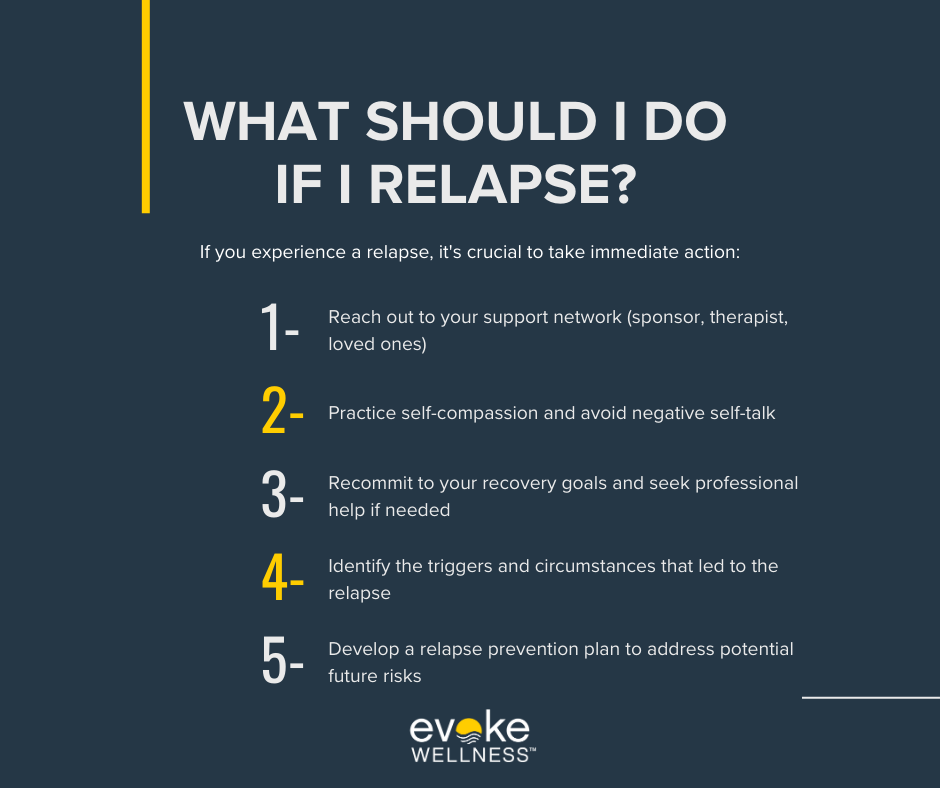As you embark on your recovery journey, it’s crucial to understand that relapse is a common part of the process. Recent studies show that 40-60% of individuals in recovery experience at least one relapse. While this statistic may seem daunting, it’s important to view relapse not as a failure, but as an opportunity for growth and learning. At Evoke Wellness at Coconut Creek, we believe in empowering you with the knowledge and tools to navigate these challenges effectively. This article will guide you through understanding relapse, developing coping strategies, and building the resilience necessary to maintain long-term recovery, even in the face of setbacks.
If you or a loved one is struggling, help is available today. Call (833) 969-3318 to speak with our compassionate team, or reach out online and schedule an appointment to begin a healing journey.
Understanding Relapse
The Reality of Relapse
- Relapse is an unfortunate reality for many individuals on the path to recovery from addiction. According to research, between 40-60% of individuals with substance use disorders experience at least one relapse episode.
- It’s crucial to understand that relapse is not a failure but rather a temporary setback on the journey to lasting sobriety.
Triggers and Warning Signs
- Relapse often doesn’t happen suddenly but is a process with various triggers and warning signs. These can include:
- Negative emotions like stress, anger, or depression
- Social situations involving alcohol or drugs
- Overconfidence in one’s ability to control cravings
- Being aware of these triggers and warning signs can help individuals take proactive steps to prevent a full-blown relapse.
Preventing and Coping with Relapse
- Engaging in a comprehensive addiction treatment program like those offered at Evoke Wellness at Coconut Creek can significantly reduce the risk of relapse.
- Evidence-based therapies like cognitive-behavioral therapy (CBT) and dialectical behavior therapy (DBT) help develop coping mechanisms and address underlying issues.
- Having a strong support system, attending support group meetings, and practicing self-care are also vital in relapse prevention.
The Path Forward
- If a relapse does occur, it’s essential to seek professional help immediately and not lose hope. With the proper support and treatment, individuals can get back on track and continue their recovery journey.
- Relapse is not a reason to give up but an opportunity to reevaluate one’s coping strategies and make necessary adjustments to achieve lasting sobriety.
Why Do Addicts Experience Relapse When Things are Going Well?
The Deceptive Calm
Even during periods of stability and progress in recovery, addicts may encounter intense cravings or emotional triggers that increase relapse risk. As reported by the National Institute on Drug Abuse, addiction alters brain circuits involved in reward, motivation, learning, and self-control – changes that persist long after getting sober.
The deceptive calm of sobriety can lull individuals into a false sense of security, making them vulnerable to relapse when faced with stress, social pressure, or challenging emotions. This paradox highlights the chronic nature of addiction and the need for ongoing vigilance.
Emotional Regulation Challenges
Individuals in recovery often struggle with regulating intense emotions, a common precursor to relapse episodes. According to a study published in the Journal of Substance Abuse Treatment, difficulty managing negative emotions like anxiety, depression, or anger increases the likelihood of returning to substance use as a coping mechanism.
Even during seemingly positive periods, underlying mental health issues or unresolved trauma can resurface, triggering overwhelming feelings that addicts may lack the tools to process healthily. Ongoing therapy and developing emotional intelligence are crucial for maintaining sobriety.
The Power of Habit and Environment
Addiction is a learned behavior reinforced by powerful neural pathways and environmental cues. A study from the Yale Journal of Biology and Medicine highlights how certain people, places, or situations can trigger intense cravings and habitual drug-seeking behavior, even after prolonged abstinence.
Despite outward progress, addicts may unconsciously gravitate toward high-risk situations or associate specific environments with past substance use. Relapse prevention strategies, such as identifying and avoiding triggers, can help mitigate these risks during stable periods.
What are the 3 Stages of an Addiction Relapse?
The Emotional Stage
- Emotions like anger, anxiety, frustration, and poor self-care can trigger relapse thoughts.
- According to a 2019 study, over 60% of relapses start in the emotional stage.
- Being mindful of emotional triggers is crucial to prevent progressing to the next stage.
The Mental Stage
- In this stage, the mind starts wrestling with the idea of using the addictive substance again.
- Cravings intensify, and the brain rationalizes potential use as a “one-time slip.”
- A 2021 report found mental obsession is the biggest predictor of full-blown relapse.
The Physical Stage
- This is the point of no return where the person actively seeks and uses the substance.
- After the first use, it becomes increasingly difficult to regain control and stop.
- Relapse rates hover around 40-60% within the first year of recovery, underscoring the need for continuous support.
Being able to identify and address these stages proactively is vital. With the right coping strategies, support system, and commitment to recovery, individuals can overcome relapse challenges and maintain lasting sobriety.
Myths and Truths About Relapse and Addiction Recovery
Debunking Common Misconceptions
- Myth: Relapse is a failure and means you’re back to square one.
- Truth: Relapse is a temporary setback, not a complete loss of progress. It’s part of the recovery journey for many.
- Myth: If you relapse once, you’ll inevitably relapse again.
- Truth: One relapse doesn’t determine your future. With proper support, you can get back on track.
Understanding Relapse Realistically
Relapse rates for substance use disorders are estimated between 40-60% within the first year after treatment. However, this doesn’t mean recovery has failed. Relapse is often part of the process, and it provides valuable lessons to strengthen your resilience.
Viewing relapse as a learning experience, not a catastrophic event, empowers you to make positive adjustments and prevents the cycle of guilt and shame that can trigger further relapse.
A Catalyst for Positive Change
While undoubtedly challenging, relapse can motivate you to re-evaluate your triggers, coping strategies, and support system. It highlights areas that need more attention and underscores the chronic nature of addiction.
With self-compassion and the proper professional guidance, you can use this experience to refine your recovery approach, reinforce healthy habits, and emerge more resilient than before.
What To Do After a Relapse?
Forgive Yourself
A relapse does not mean failure. It’s a temporary setback on the road to recovery. Be kind to yourself. Beating yourself up will only make it harder to get back on track. Acknowledge the relapse, but don’t dwell on it. Shift your focus to creating a plan to resume your recovery journey.
Seek Support Immediately
Reach out to your therapist, sponsor, or support group. Having a strong support system is crucial during this vulnerable time. They can provide guidance, accountability, and encouragement to help you regain your footing. If needed, explore options like an intensive outpatient program or sober living facility.
Identify Your Triggers
What led to the relapse? Was it a specific person, place, or situation? Understanding your triggers is key to preventing future relapses. Work with your therapist to develop effective coping strategies to manage these triggers.
Recommit to Your Recovery
A relapse doesn’t erase your progress. Refocus on your recovery goals and the tools you’ve learned. Attend support meetings, practice mindfulness, and engage in healthy activities that promote sobriety. Celebrate small wins and remind yourself why you started this journey.
Consider Professional Help
If you’re struggling to get back on track, seek professional help. Relapse prevention programs like those at Evoke Wellness can provide the structure and support you need. These evidence-based programs help you develop coping mechanisms, address underlying issues, and rebuild a strong foundation for lasting recovery.
Navigating Relapse in the Recovery Journey: FAQs
What is relapse?
Relapse refers to the return to substance use or addictive behaviors after a period of sobriety or recovery. It’s a common challenge faced by many individuals on their journey to overcoming addiction. According to the National Institute on Drug Abuse, relapse rates for addiction are similar to those of other chronic illnesses like diabetes or hypertension.
Is relapse a sign of failure?
Absolutely not. Relapse is not a personal failure but rather a potential setback in the recovery process. It’s crucial to understand that addiction is a chronic disease, and relapse can be a part of the recovery journey. With the right support and coping strategies, individuals can overcome relapse and regain their sobriety.
How can I prevent relapse?
Preventing relapse involves a multifaceted approach that includes:
- Identifying and managing triggers and high-risk situations
- Building a strong support network (e.g., support groups, counseling, family)
- Practicing self-care and stress management techniques
- Developing healthy coping mechanisms and hobbies
- Maintaining a positive mindset and celebrating small victories
At Evoke Wellness at Coconut Creek, our comprehensive treatment programs and aftercare services equip individuals with the tools and strategies necessary to navigate the challenges of recovery and minimize the risk of relapse.
Remember, relapse is not the end of the journey. With the right support and determination, you can overcome this setback and continue on your path to lasting recovery.
Conclusion
In conclusion, navigating relapse in your recovery journey requires resilience, support, and hope. Remember that relapse is not a failure, but an opportunity for growth and learning.
You can overcome setbacks and continue progressing toward lasting sobriety. Recent studies show that 40-60% of individuals in recovery experience at least one relapse, but with each attempt, the likelihood of long-term success increases. By viewing relapse as part of the process rather than an endpoint, you empower yourself to persevere. Your journey is unique, and with dedication and the right tools, you can achieve and maintain a fulfilling life in recovery.
Begin Your Journey With Evoke Wellness at Coconut Creek
Evoke Wellness at Coconut Creek is a full-service addiction treatment facility serving Florida residents. We base each of our programs on the individual’s severity of symptoms and use a combination of evidence-based therapies and holistic approaches to address the needs and recovery goals of the patient. If you or a loved one is struggling, help is available today. Call (833) 969-3318 to speak with our compassionate team, or reach out online and schedule an appointment to begin a healing journey.



